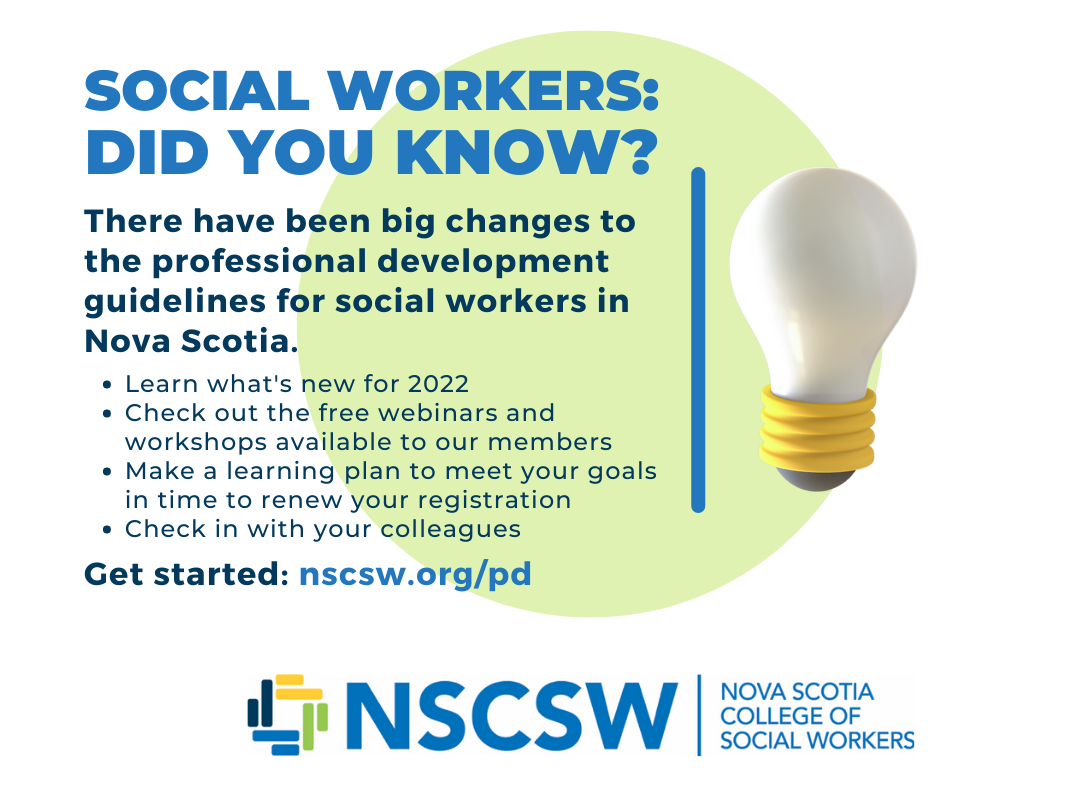
Social workers in Nova Scotia are self-regulated. This privilege of self-regulation comes with a mandate that our regulation shall ensure the safety and well-being of the public.
Last summer, a committee of hard-working social workers, serving on the ad-hoc professional development standards working group, put together a proposal to transform our professional development standards. These changes were approved by Council in November 2021 and took effect in January 2022.
We will continue to host regular lunch and learn events to give members opportunities to learn about these new standards and ask questions. Our next two sessions will be held on July 6 and August 10 at noon over Zoom. We look forward to meeting with our members and receiving your feedback on how to continue to improve our professional development activities.
Once you’ve learned about the changes you can make a plan to meet your learning goals in time for your annual registration renewal. We regularly offer free and low-cost webinars and workshops for our members; recordings of many of them are on our suggested activities page, and members can subscribe to our bi-weekly newsletter to learn about new ones as soon as they are offered. Please also check in with your friends and colleagues who are social workers, to make sure they are aware of these changes, and encourage them to reach out to us if they have questions.
The newly passed professional development changes are intended to promote the professional competency of registrants, in light of new recommendations by the Nova Scotia Regulated Health Professions Network and evolving research regarding best practices related to professional development. Furthermore, they are grounded in our professional Code of Ethics and Standards of Practice, and are aligned with CASWE-accredited social work curricula.
These changes were also informed by the current context of our profession in Nova Scotia, taking into consideration recurring patterns in complaints received by the College, our obligations to reflect and respond to inquiries and reports such as the calls to action by the Truth and Reconciliation Commission of Canada, and communication received from our members.
Registered Social Workers and Social Worker Candidates are encouraged to seek opportunities and activities that integrate their professional development goals with contributing to the field of social work, serving the public interest, improving social conditions, and promoting social justice and quality of life for all Nova Scotians
Given the importance of professional development to ensure ethical and competent social work practice, each social worker also has the responsibility to keep track of their own personal professional development activities. We have an auditing process that includes examining randomly selected professional development records to ensure documentation accuracy, and to support evaluation of the College’s professional development policy itself. Therefore it is crucial that members maintain their own personal records of professional development for at least three years, in addition to what they submit to the College during annual registration renewal, in case of any discrepancy.
This coming summer, another group of hard-working social workers will once come together, this time to improve the College’s existing policy and process for auditing professional development. If you would like to be part of this work, please contact [email protected] to volunteer or to share any comments or questions you may have.






Is it possible that the College can develop a one page checklist showing the area/topic and the required hours? I am somewhat confused and a bit overwhelmed trying to keep it straight.
Excellent request, Debra! I’m glad to say that we might already have what you’re looking for. On the webpage about our professional development standards we have links to some PDF handouts near the top of the page, which summarize the biggest change: the five new mandatory topics. Here’s the version for active members, which compares the old requirements to the new ones. For something even simpler, check out the employer handout, which we’ve sent to some of the organizations that hire large numbers of social workers in our province (and which members at smaller organizations can always pass on to their manager, or union rep if they have one).
The other changes are relatively minor. The names and descriptions for some of the subcategories were improved based on member feedback, to offer more clarity; those are also listed on the PD standards page, which you can navigate by scrolling or clicking on the table of contents. And you’ll see a new question in the online professional development tracking form that invites you to reflect on how what you learned or experienced will affect your practice.
If you still have questions, please don’t hesitate to get in touch with College staff. Giving us the chance to refine our instructions and resources before the renewal period starts in October will be a great gift.